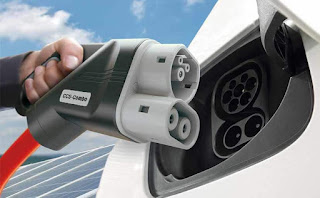Electric Vehicles for India- Myth or Reality??
Last week, I met with
a Founder of a California based start-up company who wanted to venture into a
EV or Electric Vehicle domain. ‘EV, I think is going to be the next big
disruption in India’, He said and asked for my opinion. Since I am working with
a government company in the automotive domain, he expected a realistic perspective
from my end. It was really difficult to answer his question in a YES or NO
manner, at that moment, but I tried to compile my views on the subject.
More automotive
manufacturers are now devoting a rather large chunk of their resources towards
the research and development of electric vehicles. The government is pretty
much inclined to converting possibly all automobiles plying on Indian roads to
electric vehicles. The goal to achieve this feat was earlier planned to make a
reality by 2030. However, it doesn't seem feasible for the government now. At a
maximum rate, they are now aiming for 30% Electric Vehicles on road by
2030 under 'Faster Adoption and Manufacturing of Hybrid and Electric
vehicles' (FAME-II).
Greener Future:
Transportation accounts for about 11
per cent of India's carbon emissions and is a major source of air pollution in
several cities nationwide. As many as 14 of the world’s top 20 most-polluted
cities are in India, according to a 2018 World Health Organization (WHO) report. It is the need of the hour to
introduce automobiles running on alternative fuels replacing petrol and diesel,
as 6 out of the 15 most polluted cities in the World are in
India, due to high carbon emissions. Banning petrol and diesel
vehicles could reduce 1 gigatonne of Carbon dioxide emissions in
India. Adding to this India could save 330 billion USD, by
cutting oil imports.
Price Challenge:
However, the challenge for EV to become in
reality is the very low average vehicle prices in India. For example, if we
talk globally, people in the US, the EU would not mind spending around $35,000 on a new
car. That figure is about $15,000 for people who buy a new car in China. But India,
the average price of a car is less than $10,000. And therefore, people will be
looking to buy an electric vehicle only when the prices of EVs will fall in
that range. And therefore, the report by Bloomberg New Energy Finance (BNEF)
says that India will have better progress on electric two-wheelers, rickshaws
and electric buses over the next 10 years.
The Lithium-Ion batteries
required to run electric vehicles isn't being produced in India. In fact, we don’t even have considerable Lithium reserves in India.
And we would need it in huge masses. We need to import it from countries like
Bolivia, Chile and Argentina who got large reserves of lithium ores. China is
the closest country with ample lithium reserves.
What the government needs to do:
The next most important thing is to develop
a good network charging infrastructure across the country. A good idea will be
to involve private players in this as well although that is easier said than
done because factors such as unreliable electricity supply, lack of coordination
between different government levels and lack of demand for EVs keep private
players away from investing in charging infrastructure. Also, the state-owned
utilities will need to invest in charging infrastructure as well although their
financial health is not at par with state-owned electric utilities in other
parts of the world.
Apart from this, there are some
disadvantages and hassles that need to be tackled once e-vehicles hit high in
full swing.
Conclusion:
Definitely, there are more plus
points and advantages for the concept of E-Vehicles to
flourish in India analyzing our present environment. It would for
sure take some time, but in my opinion, E-Vehicles shall take a maximum time the frame of four decades for entirely conquering the automobile empire in India.



Comments